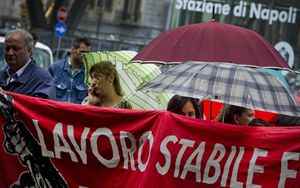(Tiper Stock Exchange) – A country marked by significant social fractures (the strongest, for more than 6 out of 10 Italians, those between rich and poor and between honest and crafty), where 66% believe they are positioned in the lower part of the social pyramid and there is a clear perception of a substantial block of social elevator, with less than 4 out of 10 Italians who think that their children can aspire to a better social position: these are the main features of the photograph of the social condition of our country traced in the FragilItalia Report “The blocked social elevator”elaborated by Area Studi Legacoop and Ipsos, in based on the results of a survey conducted on a representative sample of the population, to test their opinions on the topic.
At the head of the strongest social fractures are, equal merit those between rich and poor and between honest and crafty (61%, but, respectively, 66% and 67% in the working class), followed, in third place, by that between the people and the elite (56%, 64% among the over 65s) and in fourth and fifth place, still tied, between Italians and immigrants and between stable work and flexible work (46%). As for placement in the country’s “social pyramid” based on income and living conditions, 27% believe they belong to the middle class and only 6% to the upper class; on the other hand, as many as 66% of those questioned believe they belong to the lower part of the social scale. In particular, 39% to the “declining” middle class (understood as people whose social position is declining, holders of an income that does not allow luxuries); 15% to the fragile class (those who make ends meet with difficulty) and 11% to the lower class (those who have less than necessary or feel poor).
A picture of social polarization, in short, also confirmed by the relative dynamics perceived by the population in recent years. Only 5% of those interviewed believe that their position has improved and for 31% it has remained the same at a medium or high level; for 38% it remained the same at a low or popular level; on the other hand, it worsened for the remaining 26% (for 19% worsened, for 7% much worse). A trend that is also projected into the near future and conditions the expectations of a better social position for children, with differences in relation to the class they belong to. Among those belonging to the middle class, 35% think that children will be able to improve their position with respect to the family of origin; 53% who will keep it unchanged; 12% who will go further down the social ladder. In the working class, 37% express expectations of improvement for their children and 40% think they will be able to maintain the same position. But 23% (almost double that of middle-class people) believe they will fare worse than their family of origin.
“The country is at a standstill if the social elevator is blocked” – comment Mauro Lusetti, president of Legacoop- “we are systematically verifying how the dramatic events that have taken place in recent years, and in particular the pandemic, have not only left important aftermaths, but have accelerated processes already underway that are changing the supporting structures of this country.
The increase in costs and prices has imposed an exceptional stress test on the Italian system, highlighting all the dysfunctions that cross it. The emergency policies that we have repeatedly requested, and which, albeit in homeopathic doses, the government is trying to implement even in this extremely difficult and controversial phase, go in this direction. But that’s not enough: like the middle class that perceives itself as ‘in decline’, the country is scared. And faith in the future is our first and only ingredient for development”.
But what are the perceived reasons behind the worsening of people’s social and living conditions? The top two places include low wages (indicated by 55%, and 59% in the lower-middle class) and job insecurity (49%), followed by excessive taxes (42%) and corruption (42%). In fifth and sixth place, on equal merit (with 27%) the incapacity of parties to defend the most economically fragile people and the increase in wage gaps between managers and workers.
To complete the survey, it was asked what are the elements that can allow social redemption and which, on the contrary, those that sink it. Regarding the former, 48% indicated the ability to make sacrifices; 45% the ability to save; 37% work hard; 34% having studied; 33% the support of the family of origin. Compared to the latter, taxes are in first place (42%), followed by the cunning and dishonesty of others (35%), precariousness and fear of risk (both at 26%), bad luck (20%) and the settle for the little that is enough (19%).
